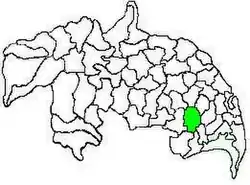Ponnur mandal | |
|---|---|
 Mandal map of Guntur district showing Ponnur mandal (in green) | |
.svg.png.webp) Ponnur mandal Location in Andhra Pradesh, India | |
| Coordinates: 16°04′00″N 80°34′00″E / 16.0667°N 80.5667°E | |
| Country | India |
| State | Andhra Pradesh |
| District | Guntur |
| Revenue Division | Tenali |
| Headquarters | Ponnur |
| Government | |
| • Body | Mandal Parishad |
| • Tehsildar | R.V.Ramana Naik |
| Population (2011)[1] | |
| • Total | 123,417 |
| Languages | |
| • Official | Telugu |
| Time zone | UTC+5:30 (IST) |
Ponnur mandal is one of the 18 mandals in Guntur district of the Indian state of Andhra Pradesh. Kilari Venkata Rosaiah – YSR Congress Party is the present MLA of the constituency, who won the 2019 Andhra Pradesh Legislative Assembly election from YSR Congress Party. It is under the administration of Tenali revenue division and the headquarters are located at Ponnur town.[2] The mandal is bounded by Vatticherukuru, Chebrole, Tsundur, Kakumanu, Amruthalur, Pittalavanipalem, Karlapalem and Bapatla mandals.[3][4]
Demographics
As of 2011 census, the mandal had a population of 123,417. The total population constitute, 60,953 males and 62,464 females —a sex ratio of 1024 females per 1000 males. 11,134 children are in the age group of 0–6 years, of which 10,939 are boys and 10,394 are girls. The average literacy rate stands at 72.94% with 81,904 literates.[1]
Administration
The mandal is partially a part of the Andhra Pradesh Capital Region under the jurisdiction of APCRDA.[5] The mandal is under the control of a tahsildar and the present tahsildar is Padmanabhudu.[6] Ponnur mandal is one of the 3 mandals under Ponnur (Assembly constituency), which in turn represents Guntur (Lok Sabha constituency) of Andhra Pradesh.[7]
Settlements
As of 2011 census, the mandal has 19 settlements. It includes 1 town and 18 villages.[8][2]
The settlements in the mandal are listed below:
- Aremanda
- Brahmanakodur
- Chintalapudi
- Dandamudi
- Doppalapudi
- Jadavalli
- Jupudi
- Kondamudi
- Mamillapalli
- Mannava
- Mulukuduru
- Munipalli
- Nandur
- Patchalatadiparru
- Ponnur (M)
- Upparapalem
- Vaddemukkala
- Vallabharaopalem
- Vellalur
- Notes
- (M) denotes a municipality[9]
Education
The mandal plays a major role in education for the rural students of the nearby villages. The primary and secondary school education is imparted by government, aided and private schools, under the School Education Department of the state.[10] As per the school information report for the academic year 2015–16, the mandal has more than 15,055 students enrolled in over 118 schools.[11][12]
See also
References
- 1 2 "Census 2011". The Registrar General & Census Commissioner, India. Retrieved 27 May 2014.
- 1 2 "Guntur District Mandals" (PDF). Census of India. pp. 93, 111. Retrieved 19 January 2015.
- ↑ "Mandals in Guntur district". aponline.gov.in. Archived from the original on 28 April 2015. Retrieved 27 May 2015.
- ↑ "Administrative divisions of Guntur district" (PDF). guntur.nic.in. Archived from the original (PDF) on 26 June 2014. Retrieved 26 May 2014.
- ↑ "Andhra Pradesh Capital Region Development Authority Act, 2014" (PDF). APCRDA. Municipal Administration and Urban Development Department. 30 December 2014. Archived from the original (PDF) on 23 September 2015. Retrieved 9 February 2015.
- ↑ "List of Tahsildars working in Guntur District as on 19.06.2014" (PDF). Guntur District Official Website. National Informatics Centre. p. 2. Archived from the original (PDF) on 16 October 2014. Retrieved 23 January 2015.
- ↑ "Delimitation of Parliamentary and Assembly Constituencies Order, 2008" (pdf). Election Commission of India. p. 22. Retrieved 11 October 2014.
- ↑ "Sub-District Details of Guntur District". The Registrar General & Census Commissioner, India. Archived from the original on 15 April 2015. Retrieved 24 May 2014.
- ↑ "Abbreviations used". censusindia.gov.in. Retrieved 26 May 2014.
- ↑ "School Education Department" (PDF). School Education Department, Government of Andhra Pradesh. Archived from the original (PDF) on 27 December 2015. Retrieved 7 November 2016.
- ↑ "R1.1 School Information". Archived from the original on 8 November 2016. Retrieved 10 November 2016.
- ↑ "Student Information Report". Commissionerate of School Education. Child info 2015-16, District School Education - Andhra Pradesh. Retrieved 8 November 2016.